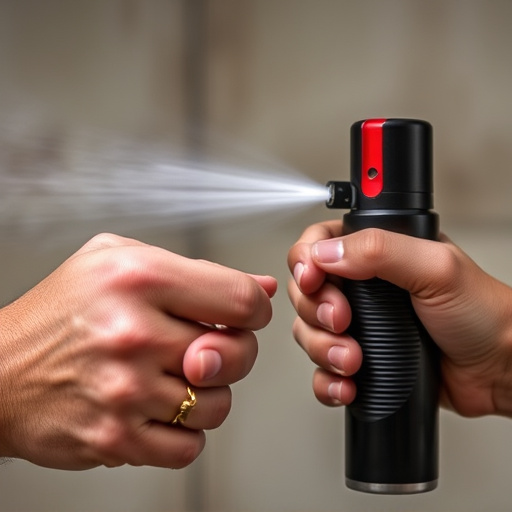Pets exposed to pepper spray need immediate first aid, including 15 minutes of water rinsing and veterinary attention. Symptoms may include irritation, breathing difficulties, and temporary blindness. Preventative measures like security systems, training, and preparedness plans are crucial to protect pets from aerosol defense mechanisms.
Aerosol spray defenses, particularly pepper spray, have become a common tool for self-protection. However, pets can also be affected by this powerful agent, leading to discomfort and potential health issues. This article delves into the understanding of pepper spray’s effects on pets, offering immediate steps to take after exposure, home remedies for first aid, and preventive security measures. If your pet has been exposed, knowing these strategies is crucial in Treating Pets Exposed to Pepper Spray and ensuring their well-being.
- Understanding Pepper Spray and Its Effects on Pets
- Immediate Steps to Take After Pet Exposure
- Home Remedies and First Aid for Pepper Spray Contact
- Preventing Future Incidents: Security Measures and Training
Understanding Pepper Spray and Its Effects on Pets
Pepper spray, a common self-defense tool, can inadvertently affect pets if they are exposed during an attack or accidental discharge. Understanding its effects and knowing how to treat your pet afterward is crucial for their safety and well-being. When pepper spray comes into contact with a pet’s eyes, nose, mouth, or skin, it triggers a response similar to that of capsaicin in chili peppers in humans. This reaction leads to irritation, temporary blindness, difficulty breathing, coughing, and intense pain.
Treating pets exposed to pepper spray requires immediate action. Rinse the affected area thoroughly with water for at least 15 minutes to dilute the spray. Seek veterinary care as soon as possible, especially if your pet’s symptoms persist or worsen. Veterinarians may administer antihistamines, eye drops, or other medications to alleviate discomfort and prevent potential long-term damage. It’s important to have a plan in place and ensure that both you and your pets are prepared for any unexpected situations involving aerosol spray defense mechanisms.
Immediate Steps to Take After Pet Exposure
If your pet has been exposed to aerosol spray, such as pepper spray used by attackers, immediate action is crucial for their safety and well-being. The first step is to remove any remaining spray from their fur or skin using lots of water. Rinse them thoroughly to dilute the chemicals and prevent further irritation. After rinsing, gently dry them with a clean towel, ensuring no spray residue is left behind.
Next, monitor your pet for symptoms like coughing, difficulty breathing, eye irritation, or excessive panting. If any of these signs appear, contact your veterinarian immediately. They may recommend further treatment, such as topical creams or additional flushing, to ensure the safety and comfort of your furry companion. Treating pets exposed to pepper spray promptly can help alleviate discomfort and reduce potential long-term effects.
Home Remedies and First Aid for Pepper Spray Contact
In the event that your pets are exposed to aerosol spray, including pepper spray during an attack, immediate and proper first aid is crucial. Start by moving them to a safe, well-ventilated area to prevent further inhalation of irritants. Rinse their eyes gently with warm water for at least 15 minutes to flush out any remaining spray residue. This step is especially important for treating pets exposed to pepper spray as it can cause severe eye irritation and discomfort.
For skin contact, remove any contaminated clothing or bedding promptly. Rinse the affected areas thoroughly with cool water. If your pet has inhaled pepper spray, ensure they have access to fresh air. In cases of severe respiratory distress, seek immediate veterinary assistance. For minor irritations, you can apply a cold compress and consider using over-the-counter antihistamines suitable for pets to alleviate itching and discomfort. Remember, treating pets exposed to aerosol spray requires swift action and gentle care to ensure their well-being.
Preventing Future Incidents: Security Measures and Training
Preventing future incidents requires a multi-faceted approach, with security measures and comprehensive training playing a pivotal role. Organizations and individuals alike must invest in robust security systems, such as surveillance cameras, access control mechanisms, and alarm systems, to deter potential attackers and protect against physical harm. Regularly updating these systems and conducting routine maintenance ensures their effectiveness.
Training programs should focus on not only self-defense techniques but also de-escalation strategies and crisis management. Educating individuals about the effects of aerosol spray, including pepper spray used in defense, is crucial. Additionally, treating pets exposed to pepper spray requires immediate attention, as it can cause temporary but severe discomfort. Veterinary care should be sought promptly to ensure their well-being and alleviate symptoms.
Pepper spray can be a powerful defense tool, but it’s crucial to understand its impact on pets and take immediate action if exposure occurs. By knowing the effects, implementing proper first aid, and taking preventive measures like security training, pet owners can ensure their furry friends’ safety in potentially dangerous situations. Treating pets exposed to pepper spray requires swift action and specialized care, making home remedies and professional assistance vital components of a comprehensive strategy for managing such incidents.
